English Words in Action, Group D
(a variety of English words which have developed through history and are currently used in our modern age)
Simply click on this banner (or the following link) and you will be on your way to stimulate your brain for greater word comprehension with quizzes based on some of the words in this unit.
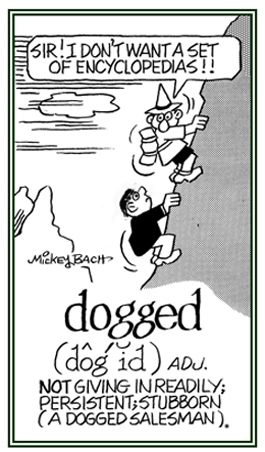
Go to this Word A Day Revisited Index
so you can see more of Mickey Bach's cartoons.
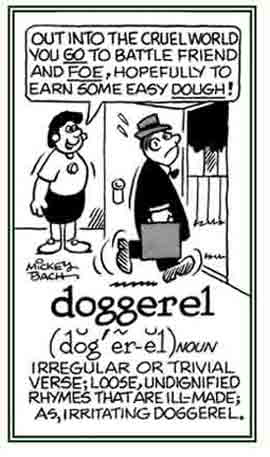
Go to this Word A Day Revisited Index
so you can see more of Mickey Bach's cartoons.
2. A state of stagnation, inactivity, or a lack of improvement: The company is still slowly climbing out of its economic doldrums.
The financial market is currently in the doldrums.
3. Usage note: Despite the fact that doldrums is plural in form, it is always used with a singular verb.4. Etymology: originally it was part of the ocean near the equator where the winds are calm or dull, the dol- of doldrums comes from Old English dol, "dull", and the word seems to have been formed by a similarity with tantrum or "a display of unreasonable anger".
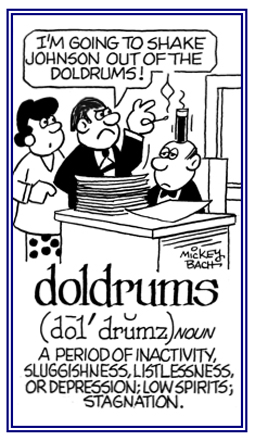
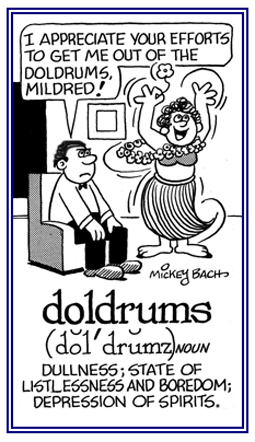
Go to this Word A Day Revisited Index
so you can see more of Mickey Bach's cartoons.
2. Etymology: from Old French daulphin; from Medieval Latin dolfinus; from Latin delphinus, "dolphin"; from Greek delphis, delphinos, "dolphin".
More Information about Dolphins
- Dolphins are very social creatures and quite affectionate with each other.
- Dolphins communicate primarily by means of sounds which include whistles, but also so-called pulsed sounds, which are often described as squawks, barks, rasps, etc.
- In addition, they use breaching (jumping and falling back into the water with a loud splash) and pectoral fin (or flipper) and tail (or fluke) slaps (hitting the flipper or fluke on the water surface).
- Their body posturing and jaw popping are also a a part of their communication techniques.
- Dolphins, and other whales with teeth, can produce high pitched clicks. When these clicking sounds strike an object, some of the sound will echo back to the senders.
- By listening to the echo and interpreting the time it takes before the echo comes back, the dolphins can estimate the distance of the objects; such as, fish or squid.
- Whales and dolphins can be found in almost every sea and ocean, from the Arctic ocean, through the tropics all the way to the Antarctic.
- Each species of dolphin has its own preferred type of habitat; some live in cold water and others live only in tropical oceans.
- There are a number of dolphin species that live in fresh water; such as, the river dolphin families; including, the Platanistidae (Ganges and Indus river Dolphins), the Iniidae (the boto or Amazon river Dolphin) and the Pontoporiidae (the baiji and the franciscana).
- Most dolphins live in the ocean, but the ocean water is too salty for them to drink.
- They get most of their water intake from their food; such as, fish and squid.
A very good example of the friendly and social behavior of dolphins can be seen
by clicking on this
Cat On Boat Plays With Dolphins site.
Someone needs to explain how a state employee who retired after more than thirty-four years and then returned to work nine years later, was able to get by with double dipping (drawing two separate incomes at the same time) by receiving nearly $85,000 in one year, or two and half times more than she did before she retired.
The draconian laws were exceedingly severe, and the term is now sometimes applied to any laws of unusual harshness of a country.
As nearly every violation of Draco's laws was a capital offense, Demades, the orator, said that the draconian code was written in blood.
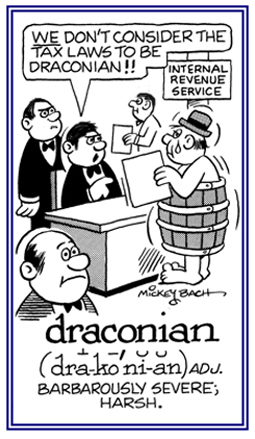
Go to this Word A Day Revisited Index
so you can see more of Mickey Bach's cartoons.
2. Rigorous; unusually severe or cruel: The judge was accused of declaring a draconianism or an excessively harsh and severe punishment for such a minimum violation of walking across the street in the middle of the block when no cars were driving by from either direction.
Some countries have too many Draconianisms for relatively minor offenses.
Latonya dreaded the thought of having to leave her friends when she gets the new job in another city.
2. Stupid or senseless talk; nonsense; useless, boring information: Tamika decided to quit wasting her time reading the drivel in her local newspaper; so, she cancelled her subscription.
So many people feel that they have heard too much drivel about the sagging economy.
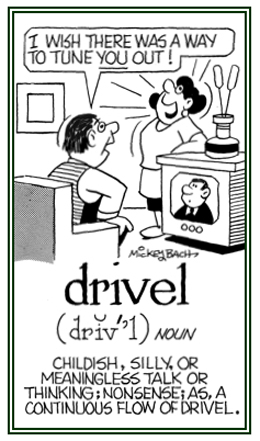
Go to this Word A Day Revisited Index
so you can see more of Mickey Bach's cartoons.
Janet was constantly driveling on about her trip to Paris during the summer which absolutely bored her classmates.
2. To drool or to slobber: The baby girl sat driveling in her high chair while her mother was feeding her.The dog on the TV show was driveling a great deal of saliva that was dripping from its mouth.
2. Someone who does tedious or menial work; a drudge: Because shoveling out the cow barn is an endless task, one of the workers at the farm felt as if he were just a drone who was caught up by the repetitious tasks of the farm.
3. A pilotless air vehicle which is pre-programmed prior to launch to accomplish a set of functions with no further human intervention or it is operated by remote control from the ground: The military operated a drone as an air vehicle having no on-board pilot that is capable of receiving continuous or intermittent commands from far away.
Drones may also be controlled by on-board sensors to autonomously make mission adjustments.
4. A low continuous noise that goes on and on: Christa could hear the drones of the bees near her window screen.5. Etymology: from Middle English which came from Old English dran, "a drone, a male bee"; given a figurative sense of "idler, lazy worker" because male bees make no honey. The meaning of "pilotless aircraft" is from 1946; apparently meaning, "a deep, continuous humming sound".
The politician was droning continuously about the shortcomings of his opponent.
Drosscapes have been developed from a world of contaminated former industrial sites, mineral workings, garbage dumps, container stores, polluted river banks, sewage works, and expanses of tarmac (black top) used for airport parking lots and military compounds.
Alan Berger of Harvard University's department of landscape architecture coined the term Drosscapes are said to be most prevalent in the United States, where the wide-open spaces beyond many city limits invite abuse. In Europe, where land is in shorter supply, drosscapes take slightly different forms because Europe recycles land more efficiently, but even so the continent is dotted with "brownfield" sites waiting for redevelopment. Some are toxic, some are havens for wildlife and, disturbingly for conservationists, a large number exist as a combination of both components.
Links to all of the groups of English words in action, Groups A to Z.
You may see the bibliographic list of sources of information for these words in action.


